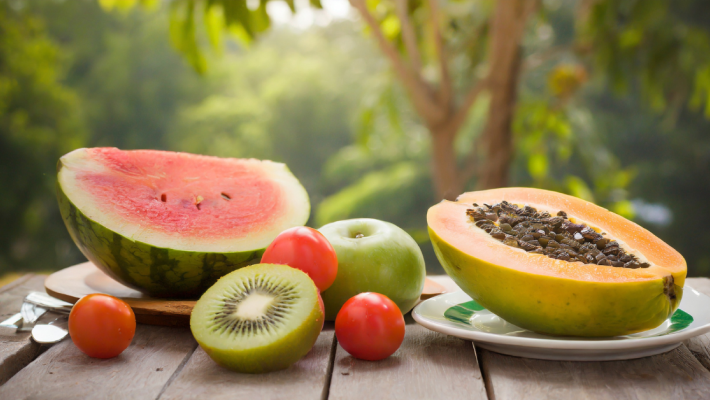Fruits Seeds

- €6,95
Everbearing strawberry seeds for long summer harvestsThese strawberry seeds of the Grandian F1 variety (Fragaria ananassa) are ideal for gardeners who want an extended picking season and impressive fruits. This hybrid selection is an everbearing...
- €6,95
Premium Hybrid Strawberry Grandian F1 SeedsDiscover the exceptional qualities of Strawberry Grandian F1 seeds, a hybrid strawberry variety known for producing large fruit strawberries with impressive size and flavor. This everbearing strawberry variety thrives both...
- €4,95
Compact everbearing strawberry seeds for long harvestsBring a steady supply of dainty, aromatic fruits to small spaces with these strawberry seeds of the beloved Baron von Solemacher type. Botanically known as Fragaria vesca, this classic...
- €6,95
Premium Strawberry Seeds for Large Fruit HarvestsExperience the joy of cultivating strawberry seeds from the remarkable Fragaria x ananassa Treasure F1 variety, known for producing exceptionally large fruit strawberries. These seeds yield sweet fragrant strawberries...
- €4,95
Unique Strawberry Spinach Seeds for Salad GreensDiscover the charm of strawberry spinach seeds, a distinctive garden spinach variety known as Chenopodium capitatum or strawberry goosefoot. This leafy vegetable seeds option offers edible leaves and fruits...
- €5,95
Vibrant Cherry Tomato Seeds for Sweet HarvestsDiscover the delight of growing cherry tomato seeds with the Super Sweet 100 F1 variety, known for producing abundant clusters of small, juicy fruits. These Solanum lycopersicum plants develop...
- €5,95
Delicious White Sweet Corn Cobs for SummerExperience the exceptional taste of Sweet Corn Glacial, a prized sugar corn variety known for its beautiful white color and extra sweet crunchy corn. This Zea mays cultivar produces...
- €5,95
Premium Hybrid Sweet Corn Seeds for Outdoor SowingDiscover the exceptional flavor of Sweet corn Tasty Sweet F1, an advanced Zea mays hybrid sweet corn variety known for its outstanding sugar content. This extra sweet corn...
- €4,95
Early Maturing Sweet Italian Bell Pepper SeedsDiscover the vibrant flavor and impressive productivity of the Sweet Italian Bell Pepper, a pointed sweet pepper variety cherished for its medium-sized horn-shaped fruits. This Capsicum annuum L. cultivar...
- €4,95
Early maturing Italian long pointed pepper varietyBring classic Italian flavor to your garden with sweet pepper of Bergamo seeds. Also known as Sigaretta di Bergamo, this heirloom Italian pepper variety of Capsicum annuum is prized...
- €5,95
Compact patio sweet pepper seeds for containersBring vibrant colour to small spaces with sweet pepper seeds Redskin F1, a compact F1 hybrid developed from Capsicum annuum. This dwarf red pepper for pots forms sturdy, bushy...
- €4,95
Vibrant Sweet Yellow Horn Pepper SeedsDiscover the unique appeal of sweet yellow horn pepper seeds, featuring the striking horn-shaped fruits of Capsicum annuum L.. This productive pepper variety is known for its deliciously sweet flavor...
- €4,95
Late Season Melon with Sweet Orange FleshThe Tendral Valenciano melon is a late honeydew melon variety prized for its oval fruit with a distinctive dark green, ribbed rind. Its flesh is soft, light orange, and...
- €4,95
Striped Tigerella Tomatoes For Greenhouse And PatioBring striking colour to your vegetable garden with Tigerella tomato seeds. This classic variety of Solanum lycopersicum is known for its eye-catching red and green striped fruits, making it...
- €4,95
Flavorful Tomatillo Seeds for Sweet and Sour FruitsDiscover tomatillo seeds from Physalis ixocarpa, known for producing juicy, sweet and sour fruits prized in many culinary traditions. Often referred to as Mexican husk tomato, these edible...
- €4,95
Vibrant Tomato Color Mix Seeds for Salad GarnishDiscover the Tomato Color Mix Seeds, a captivating selection of heirloom tomato seeds perfect for adding a splash of color to your garden and kitchen. This colorful tomato...
- €4,95
Heavy yielding salad tomato marglobe seeds varietyTomato marglobe seeds are a classic choice for gardeners looking for a reliable, mid-season salad tomato. This well-known tomato marglobe salad variety forms vigorous, high yielding tomato plants that...
- €4,95
Popular Tomato Moneymaker Seeds for Gardeners Tomato Moneymaker seeds are a favored choice among home gardening tomatoes due to their reliable performance and appealing fruit. This heirloom tomato variety produces vibrant red round tomatoes that...
- €4,95
Popular Tomato Moneymaker Seeds for Garden Fruit PlantsDiscover the classic appeal of Tomato Moneymaker seeds, a widely favored variety of Solanum lycopersicum known for producing consistently round, flavorful tomatoes. This heirloom tomato variety is ideal...
- €6,95
Mid-Early Tomato Pyros F1 Seeds for Gardeners Tomato Pyros F1 seeds offer a rewarding choice for both hobby gardening tomatoes enthusiasts and those seeking a reliable outdoor tomato variety. This mid-early cultivar produces large round...


























































